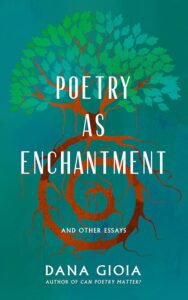
All poetic techniques exist to enchant, writes Dana Gioia.
Dana Gioia may be one of the most productive writers / poets working today. He has six poetry collections, seven essay collections, two translations (Italian and Latin), four opera libretti, 11 books for which he’s served as editor, and a contributor to several collections of essays and poems.
He came to poetry indirectly – through a 15-year business career. Yes, he quit cold turkey, to focus on poetry and writing. He was associated with New Formalism, which in the 1990s was considered counter cultural (poetry with rhyme and meter, and narrative poetry, were considered rather passe). He was named poet laureate of California. He was chairman of the National Endowment for the Arts; he championed poetry during his tenure. The recipient of numerous awards and recognitions, he’s also received 10 honorary doctorates.
In short, Gioia is a presence In American poetry. And he’s in an ideal position to produce a collection of essays entitled Poetry as Enchantment. The work contains four major essays, nine “short takes,” and four of what he calls “West Coast Reports.” The four major essays include the title one; how he met and took a class under Donald Davie at Stanford; “Robert Frost and the Narrative Poem:” and the war poetry of American poet John Allan Wyeth.

All of the essays, long and short, are excellent; the title essay is alone worth the price of the volume. It began its life as a lecture for a meeting in Beijing of the International Association of University Professors of English. It was given a second time at the Library of Congress. Then Gioia revised and expanded it for anther publication before publishing it himself in this collection.
Poetry’s aim, Gioia writes, is to enchant, “to awaken us to a fuller sense of our own humanity in both its social and individual aspects.” Poetry is not merely different in degree from ordinary language, he says; it differs fundamentally in how it communicates. In this great work of enchantment, poets, especially young poets, often have a kind of madness that polite behavior can’t satisfy.
The essay on Robert Frost is also an essay on narrative. Gioia notes that for the first half of his career, Frost wrote narrative poetry almost exclusively, which was not “a point card in the Modernist game.” Narrative poetry, which reigned supreme in the 19th century, was being displaced by Modernism. Frost adapted, but many of his best-known poems are narrative ones.

Dana Gioia
All of the essays in the collection contain this kind of insight and understanding. Poetry as Enchantment is an important work of literary (and poetic) criticism; it also offers the reader its own kind of enchantment.
A native Californian, Gioia received his B.A. and M.B.A. degrees from Stanford University and an M.A. degree in comparative literature from Harvard. His essays, including the ones in this newest collection, have been published in such general and literary publications as The New Yorker, Atlantic, Washington Post, New York Times, Hudson Review, and BBC Radio. His 2003-2009 tenure at the National Endowment for the Arts saw the launch of some of the NEA’s biggest and best-known programs, including Poetry Out Loud, The Big Read, Shakespeare in American Communities, and Operation Homecoming: Writing the Wartime Experience.
Related:
Rediscovering Seneca: Dana Gioia Translates The Madness of Hercules.
Poets and Poems: Dana Gioia and Meet Me at the Lighthouse.
Photo by David Jafra, Creative Commons, via Flickr. Post by Glynn Young.
How to Read a Poem uses images like the mouse, the hive, the switch (from the Billy Collins poem)—to guide readers into new ways of understanding poems. Anthology included.
“I require all our incoming poetry students—in the MFA I direct—to buy and read this book.”
—Jeanetta Calhoun Mish
- Poet Sidney Lanier and the Lost Cause - October 2, 2025
- Poets and Poems: A.J. Thibault and “We Lack a Word” - September 30, 2025
- Poets and Poems: Catherine Strisik and “Goat, Goddess, Moon” - September 25, 2025


Bethany R. says
“He was associated with New Formalism, which in the 1990s was considered counter cultural (poetry with rhyme and meter, and narrative poetry, were considered rather passe).” Interesting how and when shifts in style or approach emerge and are received. Thank you for this post.